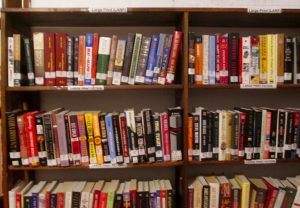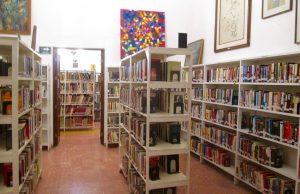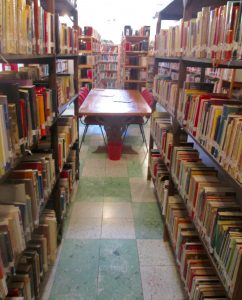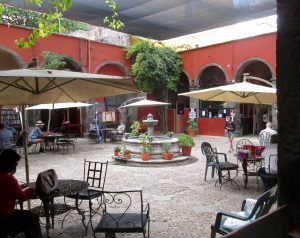When I and my younger sisters were kids growing up in a small town in suburban New Jersey in the 1950s, our big adventure every week was walking to our town’s sweet little public library over a mile from our home, taking the back way, through the woods and down a dirt road, avoiding the busy main streets, on our own. There weren’t many books at our house to speak of, so we stocked up at that library. Our walk home clutching our treasures was always slower.
I remember being recognized and welcomed by the librarian. I remember her warm smile and the fact that she remembered my taste in books as I went through various reading phases. One long phase was biographies of famous women: Dolly Madison, Marie Curie, and Pearl S. Buck come to mind. I felt at the time that these women, who I knew had no idea who I was, were having a hand in shaping my life. I still feel that way today.
Books mean different things to different people, of course. To some, sadly, they’re little more than door stoppers. To 19th century American poet Emily Dickinson they were “frigates” that “take us lands away.” A dear friend who is a retired librarian told me recently that she thinks of books as “tools.” (I immediately envisioned something cold, hard, metallic, and highly useful, like a wrench.) To me, books have always been more like living, breathing, human beings – friends, guides, teachers, preachers, lovers.
For me, the saddest part about giving away most of my belongings before retiring to Mexico was parting with my books — my own personal, beloved library of books that were carefully curated over decades and remained ever close at hand, ready to reach out to, and to return to for advice, comfort, wisdom, inspiration, or whatever.
I tried to give my books to friends, but they declined my offer, citing too many books on their own shelves already. Refuse my books? I was stunned. That was like refusing bars of gold.
It was at about this point that it dawned on me that books, especially books of literary merit, were declining in value in American culture. As an author of four books now, I find this fact more than a little disheartening. And it is a fact, as much as some will argue otherwise.
Christopher Ingraham, in the Washington Post last June (“Leisure Reading in the U.S. is at an All-Time Low”), wrote:
“Numbers from the National Endowment for the Arts show that the share of adults reading at least one novel, short story, poem or play in the prior year fell from 57 percent in 1982 to 43 percent in 2015.
“Survey data from the Pew Research Center and Gallup have shown, meanwhile, that the share of adults not reading any book in a given year nearly tripled between 1978 and 2014.”
In an earlier report on the same topic (“The Long, Steady Decline of Literary Reading,” Washington Post, September 7, 2016), Ingraham wrote:
“A number of recent studies have demonstrated that fiction — particularly literary fiction — seems to boost the quality of empathy in the people who read it, their ability to see the world from another person’s eyes. And good works of literature, particularly novels, can grant you direct access to another person’s mind — whether it be the mind of the author, or of one of their imagined characters — in a way that few other works of art can.”
I won’t go into the reasons for this steady decline. But I’m sure you can guess.
Instead, I’ll take you inside the library I visit now, at this stage of my life, here in San Miguel de Allende, Mexico, where I’ve come to live happily ever after, like a character in a book of children’s literature.
It’s La Biblioteca, a massive building that was once a combination orphanage and convent, later a slaughterhouse, and now a public library, home to more than 60,000 volumes in both Spanish and English. In fact, it is the most extensive bilingual library in Mexico outside of Mexico City – a true treasure in, and a cultural hub of, this community. (See my WOW post, “The Hub,” of May 6, 2017, for more about the Biblioteca.)
Now that my eyes are older than ever and fairly burnt out (my mother would blame this on too much book-reading, alas), I rely on the Biblioteca’s large print books in English, of which there are many, by award-winning authors:


But there are rooms upon rooms of other books there, too, all waiting to be chosen, pulled from the shelves, read and appreciated. Here are just two:
Every Monday afternoon I meet in the lovely courtyard of the Biblioteca (shown below) with my Spanish tutor, Edith, a Mexican woman in her late forties who grew up in San Miguel.
Edith tells me that when she was young, young people filled the tables and chairs inside the Biblioteca’s interior rooms, all with their faces in books. Today, she said sadly, that’s not the case. Those tables and chairs sit empty. The library’s book-filled rooms are silent because they’re seldom entered. The books, no doubt, feel abandoned.
Edith pointed to her smart phone. “Esta es la razón” (this is the reason), she said. We shook our heads. No words.
~ ~ ~
[For further information about the Biblioteca in San Miguel de Allende, visit their website: www.bibliotecasma.com.]




As I am attempting to gradually reduce the size of my personal library, I understand your difficulty in leaving yours behind. I also fell in love with the library in my small town in Minnesota and the affection I feel for these places has never diminished. In fact, a good library is one of my requirements for any place I might move. Thanks so much for sharing your story.
We expats in San Miguel are really fortunate to have this Biblioteca. It’s such a treasure!
What a loss! It’s distressing to realize that so many people don’t read! Our libraries are precious. The Biblioteca is a delightful place; so glad you have it available to you. Marge
Yes, Marge, it’s terribly distressing. Where would we be without books?
Yes Bonnie I too am one of those people who prefers a solid book with pages to turn. I’m an avid reader and love our bibliotheca!
Hugs Kate
Hugs back at you, Kate. Yes, we’re so fortunate to have our Biblioteca.
Great article. Note, the studies you cited included e-books in the broad term decline in book reading. Sad.
Yes, sad indeed, Lyn.
Dear Bonnie,
It is a terrible thing that seems only to get worse. There will always be people who want to read. That drive is inside a person. There are young people love to read, but they are in the minority. You cannot get most teenagers to read a book. I think it goes along with the disparagement of education in general. And the fact that many high school students have weak reading skills and view reading with suspicion and even dread. It’s frightening. I don’t understand how anyone can deny themselves the pleasure of reading Jamie’s Muse.
Love,
Paul
Dearest Paul — As a high school English teacher, you are certainly on the front lines of this issue, and I really appreciate your perspective. Sad — and frightening — indeed. — LU, BB xx
Thanks for documenting a sad trend; fewer readers, fewer books per person, ugh! We are so lucky to have the Biblioteca.
We certainly are lucky to have “our” Biblioteca, Pat. But I fear we book readers are a dying breed.